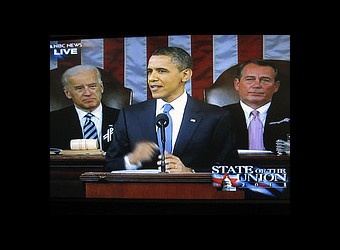Events of the past several years have altered some deeply rooted assumptions about economics and politics. The market-based worldview – a rosy vision of deregulation, privatization, free trade, limited government and few public services — has been discredited. Who can seriously talk about a “free market” and “freedom to choose” when taxpayers were forced to pay trillions of dollars to prop up right-wingers’ ideological fantasy?
Yet I wonder why there are so few substantive conversations about what should replace the market fundamentalism promoted in the U.S. and around the world for the past 30 years. It may take years for the shell-shock of the economic crisis to ease, but when that occurs, I recommend that we resume the conversation that Hungarian economist Karl Polanyi initiated with his 1944 book, The Great Transformation: The Political and Economic Origins of Our Time.
Polanyi understood that the modern market economy is not a natural, universal system for organizing societies, as its champions assert. It is, in fact, an anomaly in the long sweep of human history – one that has produced many benefits, to be sure, but has also spawned deep structural tensions that threaten to overwhelm human societies.
The Next Great Transformation
Prior of the rise of “the market” as an ordering principle for society, politics, religion and social norms were the prevailing forces in society. Land, labor and money itself were not regarded chiefly as commodities to be bought and sold. They were “embedded” in social relationships, and subject to the moral consideration, religious beliefs and community authority.
When the Great Transformation occurred alongside industrialization, Polanyi argued, markets became regarded as autonomous forces in their own right. The presumption was that “market forces” should organize all of society. We have been dealing with the consequences ever since.
The basic dilemma is that the free market cannot self-regulate itself. A laissez-faire economy is, in fact, planned. It depends on government management and social control. What’s more, because markets treat nature as essentially limitless and human beings as commodities, they are always pushing human societies and nature to the breaking point. Crises invariably erupt that require social and government interventions. The relentless push of markets cannot prevail indefinitely against the needs of human beings and nature.
Polanyi’s history lesson is one that we are learning again today.
David Bollier, former editor of On The Commons, is an author, activist and independent scholar who studies the commons as a paradigm of political culture and economics. He is co-founder of the Commons Strategy Group and blogs about the commons at “www.Bollier.org”:http://www.bollier.org/






